Many Latinos have personally experienced discrimination because of their race or ethnicity, and majorities say it’s a big problem when people don’t see racial discrimination where it really does exist. Overall, Latinos widely acknowledge the role obstacles and advantages play in helping some people succeed and holding others back. At the same time, Latinos are still more likely to have positive impressions of capitalism than socialism.
Latinos view widely available birth control as good for society
About three-in-four Latinos (74%) say widely available birth control pills are somewhat or very good for society. A greater share of Latinos say this about birth control access than about the five other social topics asked about in the survey. By contrast, smaller shares of Latinos view the following as good for society: Same-sex marriage being legal in the U.S. (37%); greater social acceptance of transgender people (36%); increasing limits on abortion in many states (27%); and a declining share of Americans belonging to an organized religion (21%). Only about one-in-ten Latinos (12%) say an increase in the number of guns in the U.S. is good for society.
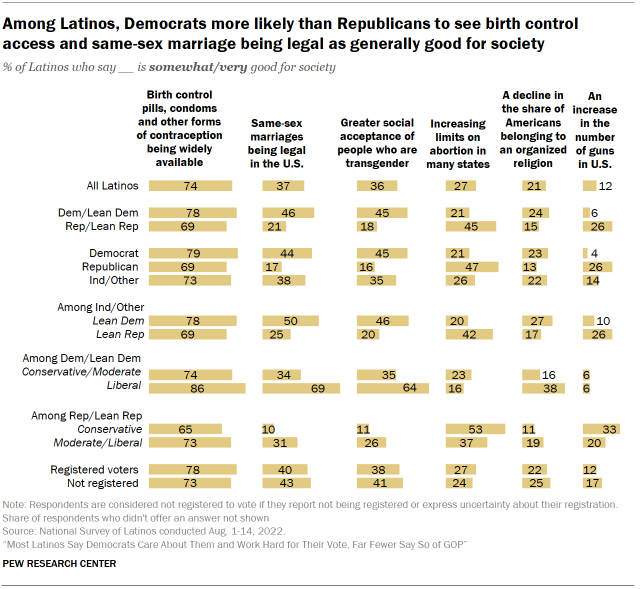
A larger share of Latino Democrats than Latino Republicans say same-sex marriages being legal is good for society (44% vs. 17%). And Latino Democrats are more likely than Latino Republicans to say greater acceptance of transgender people is good for society (45% vs. 16%). By contrast, Latino Republicans are more than twice as likely as Latino Democrats to say the increasing limits on abortion in many states is good for society (47% vs. 21%).
Hispanic Democrats have starkly different views on issues depending on how they describe their political views. Among Hispanic Democrats and Democratic leaners, 69% of liberals say same-sex marriages being legal is good for society, compared with only 34% of conservatives and moderates. Hispanic Democrats and Democratic leaners hold similar views on acceptance of transgender people, with liberals (64%) being more likely than conservatives and moderates (35%) to say it is good for society.
About half of Latinos ages 18 to 29 say same-sex marriages being legal in the U.S. (55%) and greater acceptance of transgender people (54%) are good for society. By comparison, about a third of Latinos ages 30 to 49 say the same of same-sex marriage (34%) and acceptance of transgender people (33%). These shares drop to about one-in-four among Latinos ages 50 to 64 and among those ages 65 and older.
Among Latinos who are not religiously affiliated, about half say same-sex marriages being legal (53%) and greater acceptance of transgender people (52%) are good for society. Smaller shares of Latino evangelical Protestants say the same about same-sex marriages (17%) and the acceptance of transgender people (14%).
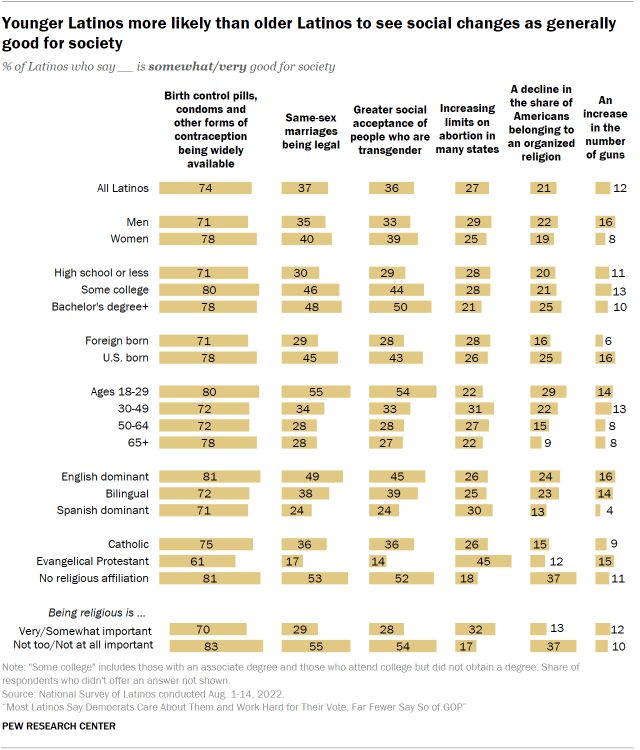
Roughly half of Latinos have personally experienced racial discrimination
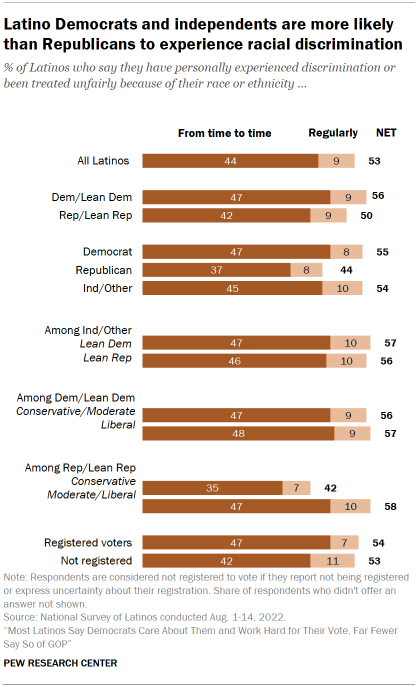
Roughly half of Latinos (53%) say they have personally experienced discrimination or been treated unfairly because of their race or ethnicity, either on a regular basis or from time to time, according to the new survey.
Among Latinos, larger shares of both Democrats (55%) and independents and other nonpartisans (54%) report having experienced racial discrimination than Republicans (44%). However, among independents, similar shares of Democratic leaners (57%) and Republican leaners (56%) say they’ve experienced racial discrimination.
There are differences among Latino Republicans and Republican leaners, with a smaller share of conservatives (42%) than moderates and liberals (58%) saying they have experienced discrimination. Among Latino Democrats and Democratic leaners, similar shares of conservatives and moderates (56%) and liberals (57%) say they have experienced discrimination.
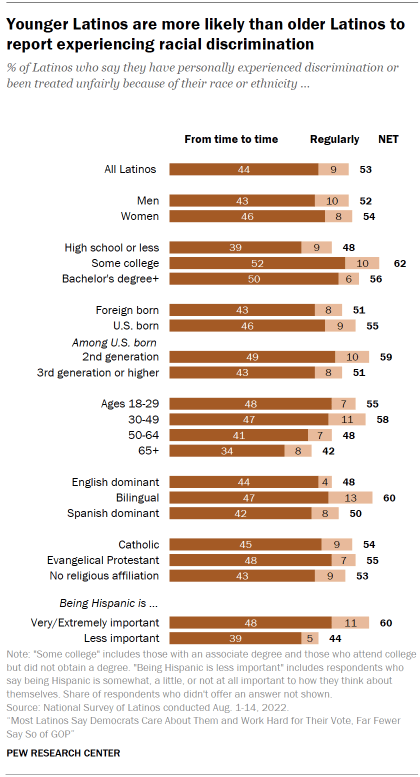
Similar shares of Latino men (52%) and women (54%) say they have personally experienced discrimination or been treated unfairly because of their race or ethnicity. Meanwhile, younger Latinos are more likely than older Latinos to say they have experienced discrimination. While nearly six-in-ten Latinos ages 18 to 29 (55%) and 30 to 49 (58%) say they have personally experienced racial discrimination, less than half of Latinos 65 or older (42%) say this.

Bilingual Latinos (60%) are more likely than those who are English dominant (48%) or Spanish dominant (50%) to report experiencing racial discrimination either regularly or from time to time.
Latinos who say being Latino is very or extremely important to their identity are more likely to say they have personally experienced racial discrimination (59%) than those for whom being Latino is less important (36%).
Among most Hispanic origin groups, similar shares say they have experience discrimination. Roughly half of Central Americans (57%), South Americans (56%), Mexicans (53%) and Puerto Ricans (52%) in the U.S. say they have experienced discrimination because of their race or ethnicity.
Most Latinos think people not seeing racial discrimination where it really does exist is a big problem for the nation
Roughly six-in-ten Latinos (61%) say people not seeing racial discrimination where it really does exist is a bigger problem for the nation today than people seeing racial discrimination where it really does not exist (35%).
Latino Democrats (75%) are more likely than Latino Republicans (36%) or Latino independents and nonpartisans (56%) to say people not seeing racial discrimination where it really does exist is a bigger problem for the country. This pattern holds even when accounting for political leaners. In fact, Democratic leaners (70%) are still more likely than those who lean toward the Republican Party to say this (36%).
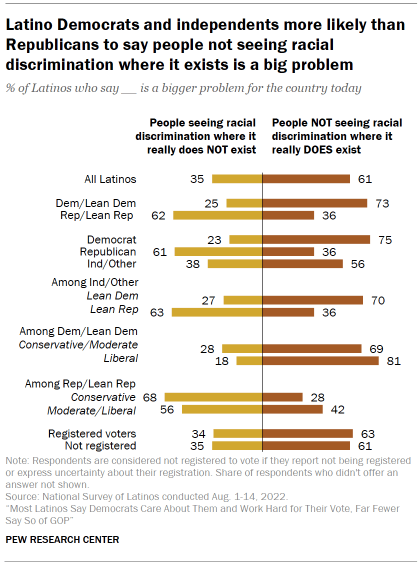
Latino Republicans (61%) are more likely than Latino Democrats (23%) or independents (43%) to say people seeing racial discrimination where it really does not exist is the bigger problem. And Republican leaners (63%) are more likely than Democratic leaners (27%) to say this as well.
Hispanic women (64%) are more likely than Hispanic men (58%) to say people not seeing racial discrimination where it really does exist is a bigger problem for the country today. By contrast, Hispanic men (40%) are more likely than Hispanic women (31%) to say people seeing racial discrimination where it really does not exist is a bigger problem. There are no significant differences by age: Majorities of Hispanics across age groups say people not seeing racial discrimination where it really does exist is the bigger problem.
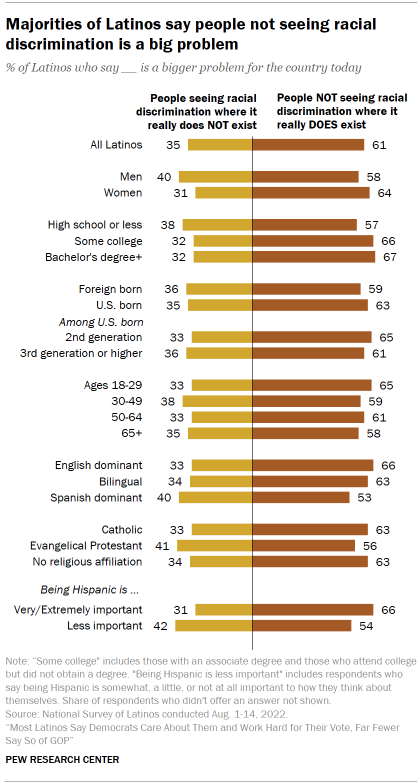
Meanwhile, U.S. Hispanics across many origin groups are more likely to say people not seeing racial discrimination where it really does exist is a bigger problem than people seeing racial discrimination where it really does not exist.
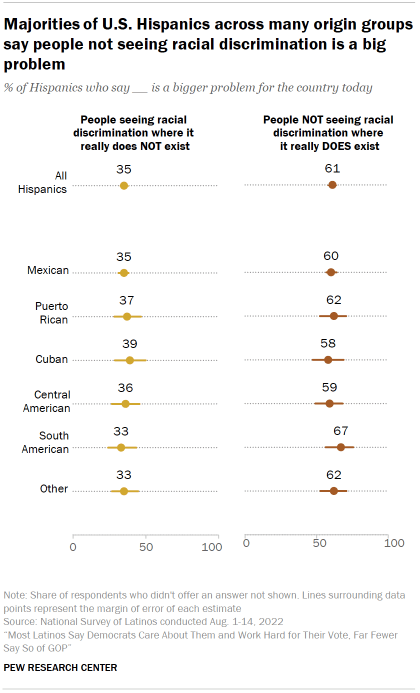
Latinos’ views on why people are poor or rich
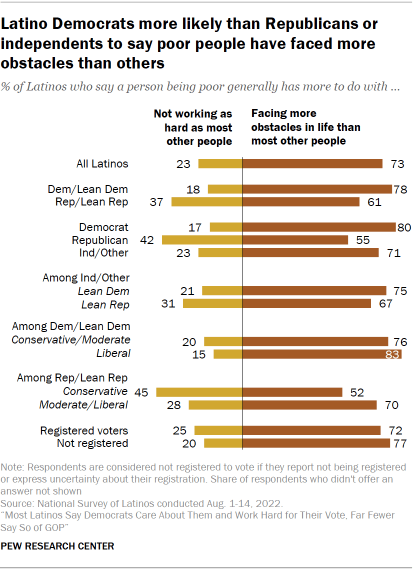
Latinos widely acknowledge the role privilege and obstacles play in helping some people succeed and holding others back. When it comes to why an individual is poor, nearly three-quarters (73%) say those individuals have faced more obstacles in life than most other people. About a quarter (23%) say it’s because those people have not worked as hard as most others.
Latino Democrats (80%) are more likely than Latino Republicans (55%) or Latino independents and nonpartisans (71%) to say people are poor generally because they face more obstacles. Among independents, Democratic leaners (75%) are more likely than Republican leaners (67%) to say this.
Meanwhile, Latino Republicans (42%) are more likely than Latino Democrats (17%) or independents (23%) to say individuals are poor because they have not worked as hard as other people.
Among Latino Republicans and Republican leaners, those who identify politically as conservative are fairly divided on this measure, with about half saying poor people haven’t worked as hard (45%) and 52% saying poor people have faced more obstacles. Other ideological groups are less divided with clear majorities of moderate and liberal Republicans and Republican leaners – as well as conservative, moderate and liberal Democrats and Democratic leaners – all saying poor people have faced more obstacles.
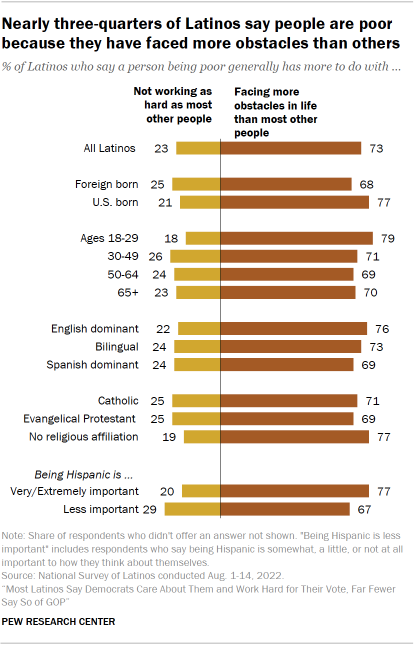
Roughly three-quarters of native-born Latinos (77%) say poor people have faced more obstacles than others. A smaller majority of foreign-born Latinos (68%) say this.
Young Latinos are more likely than older Latinos to cite obstacles as a reason for poverty. Nearly eight-in-ten Latinos ages 18 to 29 (79%) say people who are poor have faced more obstacles in life than others, compared with roughly seven-in-ten Latinos ages 30 to 49 (71%), 50 to 64 (69%), or 65 and older (70%) who say the same.
When it comes to why people have a lot of money, a majority of Latinos (67%) say rich people are rich generally because they have had more advantages in life than most others.
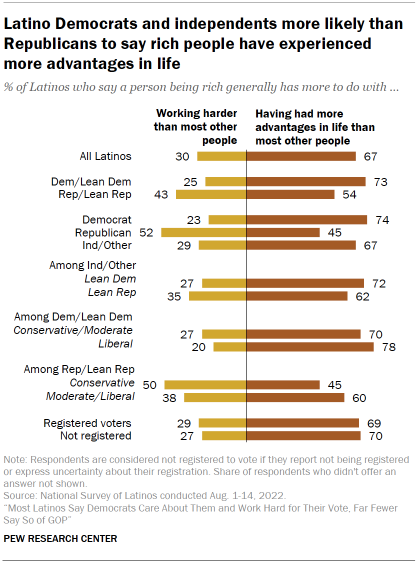
Latino Republicans are more divided than other political groups on this view, with roughly half (52%) saying people are rich because they have worked harder and 45% saying it is because they have experienced more advantages in life.
Clear majorities of Latino Democrats and independents say rich people have achieved economic success because they have more advantages than most other people (74% and 67%, respectively). Only 23% of Latino Democrats and 29% of Latino independents say people are rich generally because they have worked harder than others.
Meanwhile, nearly eight-in-ten Latino Democrats and Democratic leaners who identify politically as liberal (78%) say rich people have experienced more advantages in life. This share drops to 70% among Latino Democrats and Democratic leaners who are conservative or moderate. Among Republicans and Republican leaners, six-in-ten moderates and liberals say this, as do 45% of conservatives.
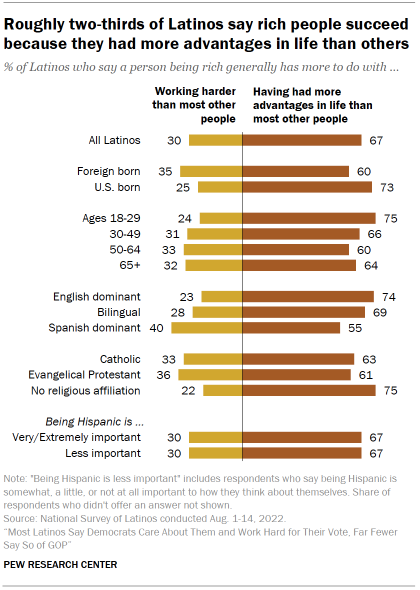
Latino immigrants (60%) are less likely than those born in the U.S. (73%) to say those who are rich achieved success because they had more advantages in life.
Younger Latinos are more likely than older Latinos to cite advantages as a reason for wealth. Three-quarters of Latinos ages 18 to 29 say this, compared with about two-thirds of Latinos ages 30 to 49 and roughly six-in-ten Latinos ages 50 to 64 (60%) and 65 and older (64%).
Latinos who are Spanish dominant (40%) are more likely to say people are rich because they have worked harder than others when compared with Latinos who are bilingual (28%) and English dominant (23%).
Latinos view capitalism more favorably than socialism
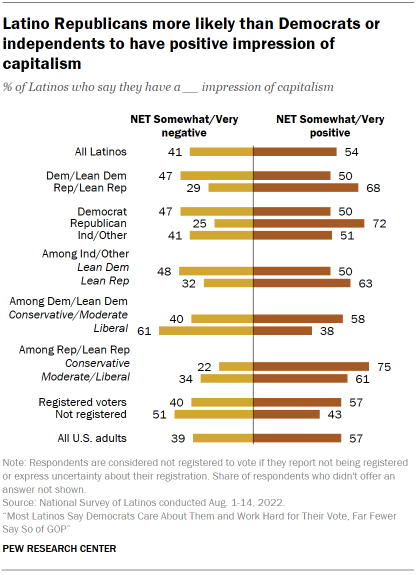
More than half of Latinos (54%) report having a positive impression of capitalism while roughly four-in-ten (41%) say they have a negative impression, according to the new Pew Research Center survey.
Latino Republicans (72%) are more likely than Latino Democrats (50%) or independents and other nonpartisans (51%) to have a positive impression of capitalism. Republican leaners (63%) are also more likely than Democratic leaners (50%) to say this. Still, at least half of all these groups have a positive impression of capitalism.
Among Hispanic Republicans and Republican leaners, three-in-four conservatives have a positive impression of capitalism, while 61% of moderates or liberals say the same. Among Hispanic Democrats and Democratic leaners, conservatives and moderates (58%) are more likely than liberals (38%) to have a positive impression of capitalism.
And while nearly six-in-ten Latino registered voters (57%) report having a positive impression of capitalism, roughly four-in-ten (43%) of those who are not registered to vote say the same.
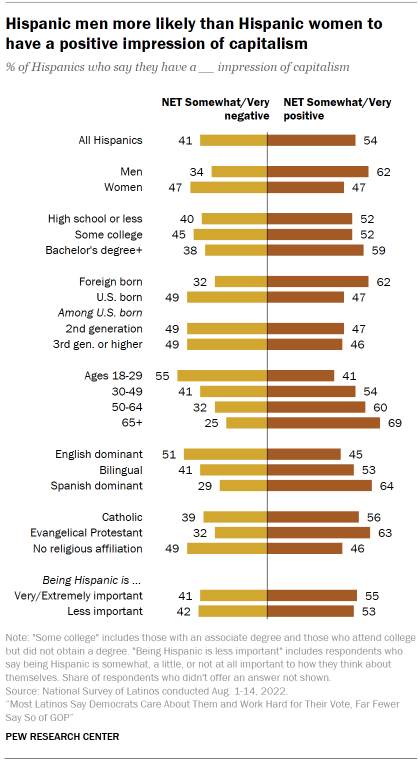
A majority of Hispanic men (62%) say they have a positive impression of capitalism while roughly a third (34%) report a negative impression. Hispanic women are split in their views between having positive and negative impressions of capitalism (47% each).
Latinos born outside of the U.S. (62%) are more likely to have a positive impression of capitalism than U.S.-born Latinos (47%), according to the survey.
Younger Latinos are more likely than their older counterparts to report a negative impression of capitalism. Some 55% of Latinos ages 18 to 29 say they have a negative impression of capitalism, compared with 41% of Latinos ages 30 to 49, 32% of Latinos ages 50 to 64, and 25% of Latinos 65 and older. By contrast, older Latinos are more likely than younger Latinos to report a positive impression of capitalism. Roughly seven-in-ten Latinos ages 65 and older (69%) say this, as do 60% of Latinos ages 50 to 64. A smaller share of Latinos ages 18 to 29 (41%) say the same.
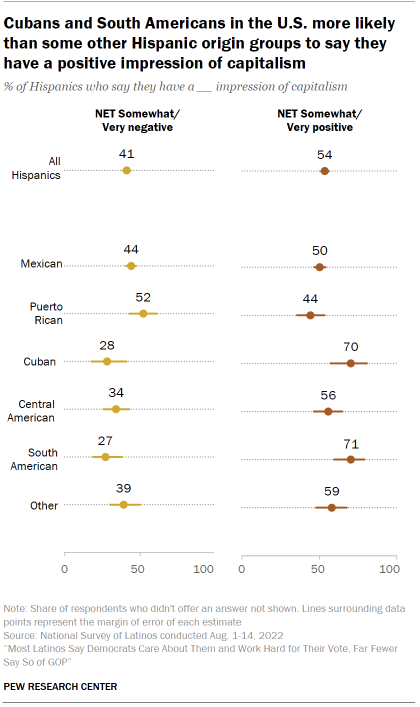
Similar shares of Latinos (54%) and U.S. adults overall (57%) express positive impressions of capitalism. And nearly four-in-ten Latinos (41%) and U.S. adults overall (39%) report negative impressions of capitalism.
Views of capitalism vary by Hispanic origin group. Mexicans (50%) and Puerto Ricans (44%) in the U.S. are significantly less likely to have a positive view of capitalism than Cubans and South Americans.
Latinos are more negative toward socialism
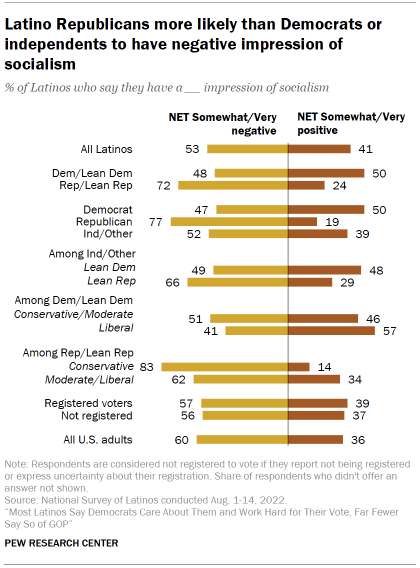
Roughly half of Latinos (53%) say they have a negative impression of socialism while 41% report a positive view.
Latino Republicans (77%) are more likely than Latino Democrats (47%) or independents and nonpartisans (52%) to say they have a negative impression of socialism. Among independents, Republican leaners (66%) are more likely than Democratic leaners (49%) to report negative impressions of socialism.
Among Republicans and Republican leaners, those who identify politically as conservative (83%) are more likely than moderates or liberals (62%) to report a negative impression of socialism. Among Democrats and Democratic leaners, those who identify politically as conservative or moderate (51%) are more likely than those who identify as liberal (41%) to say this.
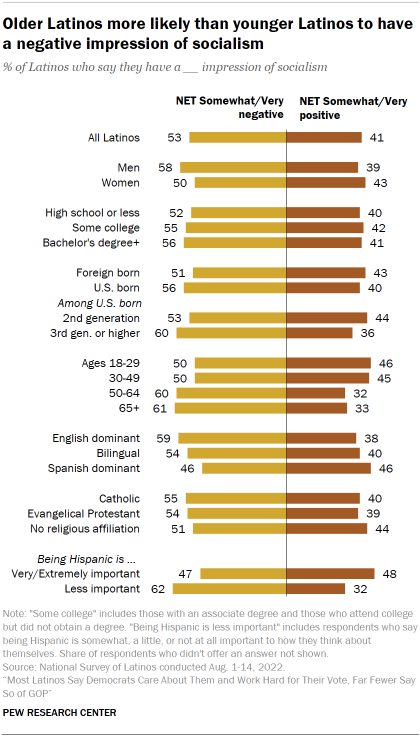
Hispanic men (58%) are more likely than Hispanic women (50%) to say they have a negative impression of socialism.
Roughly half of Latino immigrants (51%) say they have a negative impression of socialism. A similar share of U.S.-born Latinos (56%) say this.
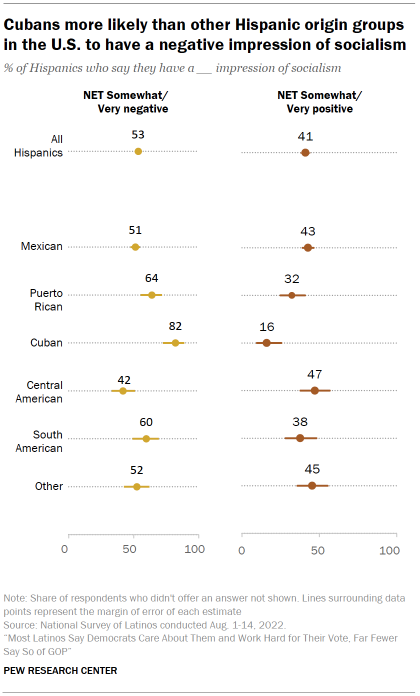
Latinos are divided by age on their impression of socialism, with roughly half of Latinos ages 18 to 29 (46%) reporting a positive impression of socialism, according to the Center’s survey. By contrast, majorities of Latinos ages 50 to 64 (60%) and 65 and older (61%) say their impression of socialism is negative.
Similar shares of Latinos (41%) and U.S. adults overall (36%) report positive impressions of socialism. However, U.S. adults overall (60%) are more likely than Latinos (54%) to express having a negative impression.
The vast majority of Cubans (82%) say they have a very or somewhat negative impression of socialism, a greater share than among Puerto Ricans (64%), Mexicans (51%) and Central Americans (42%) in the U.S. By contrast, a greater share of Central Americans (47%) and Mexicans (43%) say they have a positive impression of socialism when compared with Cubans (16%).


